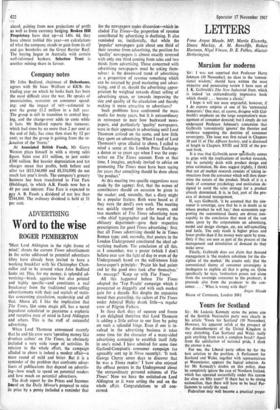• Word to the wise
ADVERTISING ROGER PENII3ERTON
'Meet Lord Aldington in the right frame of mind,' shouts the current Times advertisement in the series addressed to potential advertisers (they have already been invited to have a working breakfast with Sir Christopher Chan- cellor and to be around when John Bedford looks in). This, for my money, is splendid ad- vertising—brash, aggressive but also pointed and highly specific—and constitutes a real breakaway from the traditional space-selling advertisements with their sad recitals of statis- tics concerning circulation, readership and all that. Above all, I like the implication that The Times, like some magic pill, has a secret ingredient calculated to guarantee a euphoric and receptive state of mind in Lord Aldington and others. This is the stuff of successful advertising.
When Lord Thomson announced recently that he and his crew were 'spending money like drunken sailors' on The Times, he obviously included a very wide range of activities. In relation to the whole effort, the campaign alluded to above is indeed a modest affair—a mere round of mild and bitter. But it is a reminder of the problem that confronts adver- tisers of publications that depend on advertis- ing—how much to spend on potential readers and how much on potential advertisers.
The drab report by the Prices and Incomes Ward on the Daily Mirror's proposal to raise its price by a penny included a reminder that for the newspapers under discussion—which in- cluded The Times—the proportion of revenue contributed by advertising is declining. It also reminded us, incidentally, that while the 'popular' newspapers gain about one thiid of their revenue from advertising, the position for 'quality' newspapers is almost exactly reversed with only one third coming from sales and two thirds from advertising. Those concerned with advertising newspapers must be asking them- selves: is the downward trend of advertising as a proportion of revenue something which can be reversed by good marketing and adver- tising, and if so, should the advertising appro- priation be weighted towards direct selling of advertising space, or towards improving the size and quality of the circulation and thereby making it more attractive to advertisers?
Such problems have confronted the mass media for many years, but it is extraordinary in retrospect to- note- how backward news- papers, and particularly 'quality' newspapers, were in their approach to advertising until Lord Thomson arrived on the scene, and how little they spent on advertising. When I read of Lord Thomson's spree alluded to above, I called to mind a scene at the London Press Exchange a dozen or so years ago when I was the copy- writer on The Times account. Even at that time, I imagine, anybody invited to advise on promoting The Times must have been saying for years that something should be done about 'the product.'
At this meeting two specific suggestions were made by the agency; first, that the names- of contributors should on occasion be given to the reader; and, secondly, that a diary might be a popular feature. Both were heard as if they were the devil's own work. The meeting was quickly steered into safer waters, and two members of The Times advertising team —the chief typographer and the head of the obituary department—gave their respective prescriptions for good Times advertising: first, that all Times advertising should be in Times Roman type; and, secondly, that posters in the London Underground constituted the ideal ad- vertising medium. The conclusion of all this, as I remember, was a poster (which I don't believe ever saw the light of day or even of the Underground) based on the well-known Irish horse-coper's principle: 'Praise his bad points and let the good ones look after themselves.' Its message? 'Keep up with The Times.'
All this happened before The Times adopted the 'Top People' campaign which it prosecuted so doggedly and with such modest gain for a decade. But despite the expansive mood then prevailing, the sailors of The Times under Admiral Haley drank little—a regular crew of Pilgrim Fathers.
In these dark days of squeeze and freeze I am delighted therefore that Lord Thomson is adding a little colour to our lives by going on such a splendid binge. Even if one is in- volved in the advertising business it takes some time for the character of a many-sided advertising campaign to establish itself fully in one's mind. I have admired for some time Garland-Compton's -consumer campaign (so agreeably sent up in Nova recently): 'It took George Cherry seven days to discover that he was a Times reader.' I have also enjoyed the offbeat posters in the Underground about 'the extraordinary personal columns of The Times.' Now we have the switched-on Lord Aldington as it were setting the seal on the whole affair. Congratulations to all con- cerned.


































 Previous page
Previous page